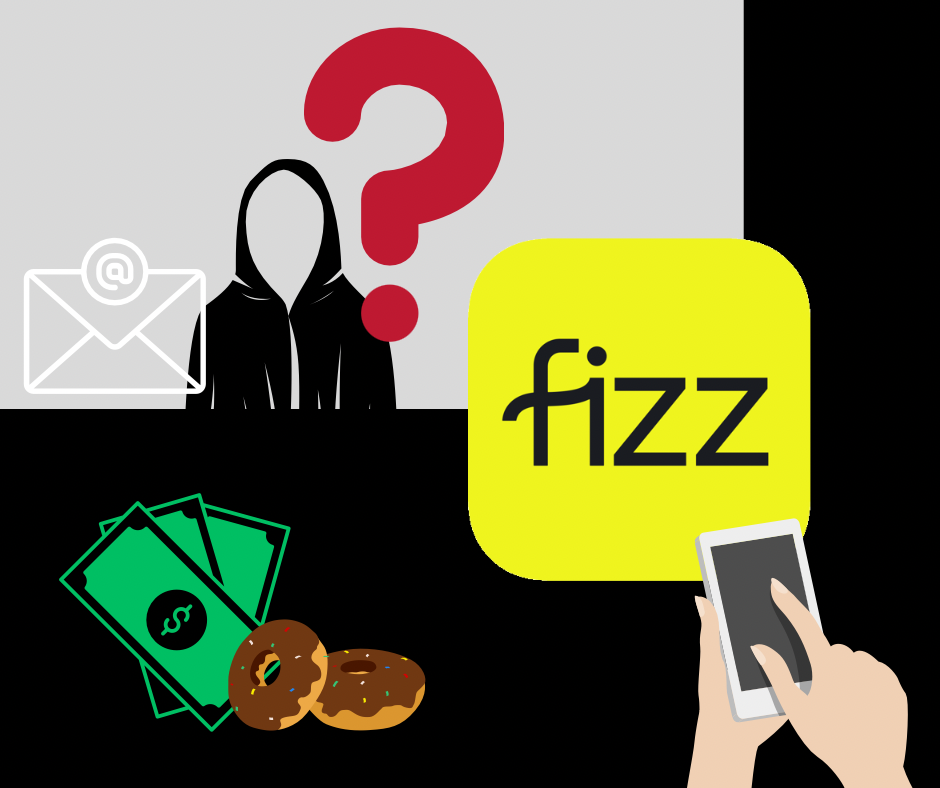Fizz, an anonymous, Reddit-style app for college students, launched on Hawk Hill campus April 18, almost immediately generating controversy, much as it has on other college campuses.
Only available to college students and users with a valid .edu email address, the app was created by two Stanford University students in 2021. It allows students to post texts, photos and polls without a username or identifying information. Users can upvote or downvote content, and also direct-message each other with their real identity.
Yik Yak, a similar app that launched in 2013, was also popular among college students, but also faced criticism for facilitating cyber bullying.
What seems to set Fizz apart from other apps like it, though, is its recruitment and promotion techniques. As it has done on other campuses across the country, Fizz blitzed potential new users with invites and recruited groups of St. Joe’s students, calling them “ambassadors,” to promote the app.
Ambassadors encouraged students by offering donuts, hats and money to those who downloaded the app and reposted a Fizz ad on their personal Instagram stories.
Hayes Yearick ’26 said he downloaded the Fizz app after his friends did and then he received an email from Fizz with an offer to be a student ambassador, which he accepted.
“The original payment for ambassadors was $60 with a $20 bonus included,” Yearick said.
Students were offered to be paid ambassadors of the app by Kiley Ritter, a marketing analyst for Fizz, through GroupMe texts, according to a screenshot obtained by The Hawk. Other students were told by Ritter they would receive a Venmo payment of $15 if they posted a shoutout of the app within the day.
Ambassadors tabled and handed out flyers in and outside Campion Student Center, Merion Hall and Starbucks April 18. Flyers were also posted in Villiger and McShain residence halls.
According to Beth Hagovsky Ed.D., director of Student Leadership and Activities, Fizz made no request for approval of these activities and was not granted permission to solicit on campus by means of tabling or flyers.
“They did not ask if they could table, they didn’t ask if they could have space on campus, they certainly didn’t ask in the residence halls if they could put flyers on people’s doors,” Hagovsky said.
All of the supplies and services for the tabling and promotion events were provided by Fizz, Yearick said.
“They were given money by the company to order donuts,” Yearick said. “The bucket hats were shipped here, so it was through the company. The company paid for everything.”
Ryan Barnhardt ’26 said that when he decided to become an ambassador, he was under the impression that the app had already been approved by the school, and the company was given permission to solicit on campus.
“Everything seemed perfectly normal,” Barnhardt said. “I thought there was permission from the school because we got an email [from Fizz] and everything, so I thought everything was OK.”
Fizz did not respond to questions by press time.
On the app’s launch day, a flood of posts containing negative comments toward fraternities and sororities on campus appeared on Fizz. These comments’ main targets included Alpha Phi Sorority and Lambda Chi Alpha Fraternity.
Lauren Ervin ’23, member of Alpha Phi, said the comments often crossed the line of being offensive.
“I understand that, since we are such a small school, everyone’s going to be in each other’s business, but it’s not anybody’s place to post about other people and to talk about other people,” Ervin said. “There’s a difference between making a funny joke and then just being passively mean. And I think Fizz is mostly just being passively mean.”
Havogsky reached out to members of the fraternities’ leadership via email, encouraging them to not post on the app or engage with posts directed at their organizations. She also sent an email to orientation leaders saying to not pay attention to the app and to not promote it to other students.
Ross Radish, vice president of Student Life and Dean of Students, said Fizz can be difficult to monitor because profiles cannot be tracked.
“The addition of anonymity adds yet another layer of concern as students may encounter negative content,” Radish said. “We are encouraging our students to use caution and be mindful of others if they choose to download this app.”
Despite the concerns, some Fizz ambassadors are still confident that the app can be more than another anonymous gossip app. According to Yearick, despite the negative posts, the main goal of the app is to be a platform for students to openly share their thoughts.
“I’d say the purpose of the app is for people to speak their mind truthfully without the fear of judgment,” Yearick said.
Caitlin Kiefner ’24 downloaded the app after hearing about it from a friend. She said while the app has the potential to be more than just a forum for mean posts, she wasn’t sure how useful it could really be.
“I don’t think there’s many benefits other than maybe helping people with classes and professors, but they’re not using it for that. So I don’t think there’s any benefits right now,” Kiefner said.
Matt Kelly ’26 contributed to this story.














































